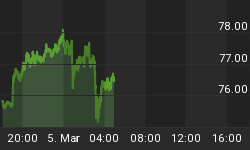A Brief Review
Instead of allowing a cathartic and reconciling recession to run its course, the Fed decided last year to again bail out the economy by greatly expanding the money supply. In this latest case of artificial intervention, the expansion in the monetary base was a record-breaking trillion dollars, but that intervention has abated in the last few months. What should become clear fairly soon is that the apparent recovery in the markets and the economy has been built primarily on the devaluation of the US dollar, not from a healing of the economy's fundamentals. That clarity will become evident once the dollar begins to make a brief rebound.
Temporary Sanity
For the last few months, the Fed has temporarily halted its assault on the greenback in the mistaken belief that the economic crisis has ended. Therefore, the most likely result will be a major correction in the market and a resumption of economic deterioration. Unfortunately, that should eventually cause the Fed to resume its misguided efforts to bolster growth by wrecking the currency. The Fed's conundrum is this: whether he is aware of it or not, Ben Bernanke needs to defend the dollar and raise interest rates to provide for a viable and long-lasting recovery. But the short-term effect would be a devastating recession which is, of course, politically untenable.
Negative Correlation between Dollar and Markets
The basis for the perceived healing has been a Fed-induced 12% drop in the US dollar since March alone, which has caused the S&P 500 to rally 50% and copper to increase 80% in the same time period. It's just not a coincidence when the dollar goes down; stocks and especially commodities go up. But remember monetary policy works with a lag. The Fed has since halted the increase in the monetary base which reached $1.77 trillion in May of this year, and has now reduced it to $1.64 trillion today.
The result has been a sharp decrease in the rate of increase for all monetary aggregates. The monetary base is up 93% YOY but is down 4.2% since the beginning of the year. M2 is still up 8% from last year but up just 3.5% from January. And perhaps most importantly, the four week compounded annual rate of change in the monetary base is actually negative 26.3%!
What this means is that at least on a short term basis the dollar may be oversold and commodities and stocks overbought. We can hope that Ben Bernanke will not acquiesce to the desire to be reappointed and maintain this brief period of monetary sanity. If he behaves like Paul Volker and doesn't care about being liked, he will drain the excess liquidity and allow the severe economic contraction to run its course.
However as mentioned earlier, the most likely outcome will be for the Fed to rebuild the base in an effort to stem the coming slide in markets and the economy.
That's because we just haven't yet acknowledged the reality of our addiction to debt and inflation as the basis for economic activity. What I find most amazing about all this is how most in Washington and Wall Street fail to recognize what caused the crisis in the first place. The problem never was that there wasn't enough borrowing, consuming and cheap money around. The problem was that the level of debt in the country had become unsustainable. In fact, as a country we are still actually increasing our level of debt. Therefore, all our perceived healing was predicated on the devaluing of the dollar, not from the paying down of our obligations or a repudiation of our past behavior.
We just can't escape the day of reckoning. The country will most likely go through a devastating bought of inflation to avoid a strengthening dollar and further erosion in asset prices. However, a protracted period of deleveraging is still needed as a nation. What we need is to return to real economy based on a sound currency and reduced debt. That will certainly be painful in the short term, but the only way to provide a long lasting and healthy economy.
Be sure to listen in on my Mid-Week Reality Check
Follow me on Twitter: http://twitter.com/michaelpento















